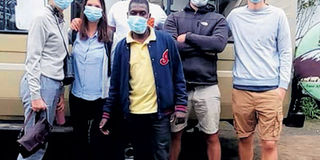How tourists are staying safe on safari

Mateo Vargas, 25, based in Dar es Salaam, recently travelled to the north of the country to visit Tanzania’s most famous safari park, Serengeti. But due to the coronavirus pandemic, the high season is experiencing fewer tourists than ever before, with little international flights up and running.
“This is my first time to the Serengeti. I am most looking forward to seeing the wildebeest migration, and the cats, like lions and leopards. At the moment, it’s not that busy here but there are still more people than I expected, so I am taking more precautions than I thought I would have to,” says Mateo.
Although many international tourists have been forced to cancel or postpone their trips, this has resulted in a surge in local tourism, with citizens and foreign residents making the most of this quieter period.
Despite the lower number of international tourists, many visitors to the national parks are still exercising caution, as guidelines for coronavirus highlight the risks of travelling.
For Mateo, this has meant practicing the key hygiene behaviours that reduces the chance of catching the virus. “Before coming on safari, I was slightly concerned about Covid-19, particularly as there could be a chance of interacting with international tourists that have travelled from high-risk countries. However before I travelled, I was assured by the guides that all the measures were in place to keep people safe and healthy. As someone with asthma, I have to take extra precaution, and so since the journey has started, I wore a facemask when on the plane, and on arrival in the Serengeti, I have practiced regular hand washing - even washing my hands up to 10 times a day! It has been quite easy to practice social distancing and the hotels are not so busy. All the staff are wearing face masks so I haven’t felt exposed,” says Mateo.
This was echoed by Julia, 37, who has been living in Dar es Salaam for a year and a half. She travelled with her family to visit the Serengeti on a two week trip.
Initially, they had planned to visit the Serengeti with their friends from Italy, however due to flight complications they had to cancel last minute. Julia and her family decided to do a self-drive tour through the Serengeti, minimising the risks of coming into contact with guides and other tourists. She said that since arriving, her and her family have felt safe. “We wanted to take a break for a few weeks, but we didn’t want to go back to Europe, so even though our friends cancelled the trip, we decided to come anyway,” says Julia.
Adding, “Since the pandemic started, we haven’t been overly cautious. As we are young and healthy, we are not in the risk category for becoming seriously ill. But we still took some precautions, like wearing facemasks, which was mandatory on the flights. I am really happy to see all the hand washing and sanitisers that have increased. Generally, I am delighted to see this, as hand washing protects against other diseases too, not just Covid-19. But we generally feel that on safari, it is a safe place. We are out so much in the open air, the hotel restaurant space is well ventilated and the tables are spread out. I think our friends could have visited without having any worries of getting the virus, but we are hoping they come next year instead,” explains Julia.
The safari guides themselves feel that the country is well prepared to receive tourists for safari.
Castor Floridy, a tour guide based in Arusha, says that the Tanzania Association of Tour Operators have helped the parks to implement the necessary measures to keep staff and tourists healthy.
“Each national park has its own ambulance car, and a place to check people if they think they have symptoms, there are doctors and so on. We are cleaning the cars regularly and we have supplies of sanitiser and facemasks,” says Castor.
For myself, there has never been a better time to go on safari. I travelled in a group of 14 to the Serengeti, and chose to visit at this specific time due to the low number of international tourists. I didn’t really think twice about [coronavirus] when we were going. I think it was the best time for us to travel to Serengeti as we knew the park would be quite empty.
For half the trip we also did self-driving and we camped, so it was easier to keep ourselves safe and away from others. For the time we stayed in the lodge, all staff wore masks and they had a handbook on how to reduce the risk of the virus.




